- Home
- Jason Webster
A Body in Barcelona: Max Cámara 5 Page 7
A Body in Barcelona: Max Cámara 5 Read online
Page 7
Cámara had grown to enjoy the traditional Valencian drink, despite its earthy taste. Cool and sweet, it was ideal after a day at the beach, sitting in a bar with high ceilings and marble tabletops. He was less convinced, however, by the health-giving properties Valencians claimed for it – it was said to cure everything from high cholesterol levels to stress and even a low sex drive.
Beyond the tiger-nut fields, he noticed patches of darker green where orange trees barely taller than himself sprang out of the ground in tight rows. Between each field, water channels lined with brick acted as dividers. He caught sight of a group of men wearing espadrilles and with mattocks in their hands busy irrigating a patch by the side of the road: water flowed out of gaps in the water-channel walls and seeped its way across until every inch of the field had been reached.
‘Some of them, like those guys, still do it by hand,’ Torres said, glancing over. ‘Others use satellite technology now. It has to be perfectly flat for the water to spread to every corner.’
Interspersed among the fields, sometimes standing in small groups, stood two-storey farmhouses – alquerías – with terracotta-tiled roofs, often sloping into a central patio area to collect rainwater.
The car overtook a blue-and-red painted cart being pulled by a horse, a man with a straw hat and a thin, ragged cigar sticking out of his mouth, sitting on a bench at the front. Dragging on the road behind, attached to the cart by a chain, was a large tractor tyre with an enormous rock sitting on top.
‘To keep the horses strong for pulling ploughs,’ Torres explained. ‘It’s illegal, but everyone turns a blind eye.’
Everywhere were reminders that they were in the modern world: the cars and buses on the road ahead; electricity pylons cutting the sky; an occasional billboard with adverts for shaving foam and whisky; even a plane on the horizon, coming in to land at the airport not a few kilometres distant. But driving into the huerta – the horticultural belt to the north of the city – felt in many ways like a journey back twenty or thirty years in time. Cámara glanced over his shoulder – Valencia was there: they had barely left its precinct. Yet here was an agricultural world on its doorstep still getting on with its business as it had for hundreds of years, oblivious almost to the metropolis that had mushroomed in front of it and encroached on its land.
‘I’m not sure I’ve ever been to this area before,’ Cámara said.
‘Not surprising,’ said Torres. ‘You mention names of the villages round here to Valencians and they don’t know where you’re talking about. And yet they’re right on the outskirts of the city.’
Carpesa was a small place, made up of barely four or five streets. They drove through a square with squat Judas trees in the centre, past a baroque church with an imposing brick tower topped with a carved stone bell chamber, and down a narrow lane before the houses stopped and the fields resumed again. More tiger-nut plants, waving in the light breeze blowing in off the sea, with orange groves beyond in the middle distance. Torres parked beside a rubbish container. They checked they were on the right street and got out, looking for number 18.
Torres rang the doorbell three times and had waited several minutes before deciding that Vicente García must have gone out. The street seemed deserted, but Cámara spotted an elderly lady sweeping the pavement outside her doorway.
‘He’s gone,’ she answered. ‘Staying with relatives in the city. That business about the dead boy.’
She shook her head and carried on sweeping.
‘He’s had enough tragedy, that man, without this happening to him. First his parents died, then the accident that put him in a wheelchair. He was just beginning to pull through. Then this happened. Hit him hard, seeing that. Dog wasn’t the same either. It was a knock for the both of them. ¡Ay! What kind of a world is it where little children get murdered? I ask you.’
She tutted and stepped back into the shade of her home, leaving Cámara on the pavement.
‘The body was found over there, in that direction,’ Torres said when he rejoined him.
‘Let’s walk.’
They headed silently away from the village along a narrow road, past a row of abandoned tractors, rusting and in pieces next to a warehouse with a corrugated roof.
‘This is Segarra’s territory,’ Torres said after a while.
‘Meaning?’
‘He comes from round here, was born in a village just a few kilometres east. But this is his land, his world. The name of his supermarket – Horta. That’s the Valencian for huerta.’
‘I imagine he owns quite a bit of it,’ Cámara said.
‘Some, I’m sure,’ said Torres. ‘I’ll check. But this isn’t an area of big landowners. Traditionally everyone had their little patch round here and that was practically enough to get by on. It’s incredibly rich land – you can get three crops a year out of it if you want.’
They crossed a low bridge over a water channel and into the orange groves. The fruits were still green in October, but in a month or so the first crops would be ripening in time for Christmas. Beneath the trees, low wild flowers grew, creating bright thick carpets that stretched across the landscape.
‘Segarra started as a fruit-and-veg seller not far from here,’ Torres continued. ‘Then the business grew and he turned it into a supermarket – one of the first in the city. But it all began here. They always say about him that he’s still a Valencian farmer boy at heart, that the millions haven’t gone to his head. That that’s the reason for his success.’
They had passed the first orange grove, with its manicured trees, and had reached a scruffier area: a few pieces of rubbish were scattered in patches of long, yellowing grass. The orange trees were clearly not being looked after, sprawling into odd shapes or with dead branches and dried leaves.
‘If this land is so fertile,’ Cámara said, ‘how come so much of it has been abandoned?’
Torres gave a shrug.
‘Farming doesn’t bring in as much as it once did. Much of this land is owned by elderly guys, and their children don’t necessarily want to carry on the family tradition. Too much like hard work for little pay.’
‘Still,’ Cámara said. ‘You’d think they’d do something with it, rather than just leaving it like this.’
At the end of the road they could make out a small brick building with wide cracks in the walls.
‘That’ll be the well,’ said Torres.
Beyond it, fluttering among a dense clutch of vegetation, they could see blue-and-white police tape in another orange grove.
They walked towards it, leaving the road where the tarmac ended and continuing along the dirt track, skipping over a water channel and into the field. Torres walked straight towards the hole in the middle where the tape was attached to some trees, cordoning off the area where Fermín’s body had been discovered. Cámara took a different route, crossing diagonally, randomly through the trees, looking down at the debris around his feet – mostly rusting cans of beer and empty food packets – before glancing up. The bell tower of Carpesa was visible several fields away, while in the opposite direction a number of alquerías were scattered about. One, that looked larger and whiter and better kept than the others, caught his eye.
Torres was standing still, his hands behind his back, staring at the bottom of Fermín’s shallow grave. Both of them had read the Científica’s crime-scene report. It had little more information to give than what they already had – the dryness of the soil meant that no footprints had been discernible, while the area was often used by teenagers from nearby villages to drink and smoke late into the night. The quantity of rubbish they left behind made finding anything relating to the crime almost impossible. All the científicos could say was that the hole had been dug by a standard spade – not a mattock, which was the usual tool used for digging and working the earth by huerta farmers.
Cámara stood silently next to Torres and smelt the air: there were traces of stale urine and worse.
‘A shallow grave,’ Torres said in
a low voice. ‘You’d think anyone who knew about snapping someone’s neck so cleanly would also understand the basics of burying bodies. I mean, two metres, minimum. Otherwise …’
‘Someone else took care of the burying?’ Cámara said. ‘Someone less … qualified?’
The word struck the wrong note, but he could not think of an alternative.
‘And then doing it here,’ Torres continued. ‘OK, so it’s an abandoned field. But it’s commonly used by kids, it’s not that far away from where people live. And then the ground is covered with weeds. You dig that up and it’s pretty bloody obvious.’
He paused.
‘It’s almost as if—’
‘It’s almost as if whoever did this wanted the body to be discovered,’ Cámara finished for him.
Torres took a deep breath.
Cámara waited, then spoke.
‘That big white alquería over there,’ he said, pointing over the orange trees. ‘Do you know whose it is?’
‘That,’ said Torres, ‘is the Alquería del Duc. That’s Alfonso Segarra’s house.’
TWELVE
PATERNA WAS A satellite town to the north-west of Valencia. It was here, on an industrial estate not far from the airport, that the Horta headquarters was located. Cámara and Torres drove up to a sprawling complex of buildings, mostly painted white, but unpretentious and functional. It might almost have been a hospital or series of government office blocks. Nothing, apart from the name of the company in large green letters on top of the main structure, declared that this was the home of one of the most successful businesses in the country. Segarra created so much wealth for Spain that his opinions on the economy made headline news, while watching how his company operated and analysing any new measures that it introduced was something of an obsession among financial journalists. Horta had adapted early when the economic crisis began, and as a result had survived and actually increased its profits. In Madrid, politicians were in the habit of saying that the country needed more men like Segarra.
Cámara and Torres signed in at the reception desk and were given visitors’ cards. Torres clipped his to his jacket, Cámara put his in a pocket and promptly forgot about it. Both were surprised at the mildness of the security set-up: secretaries and assistants appeared to be the only shields that Segarra employed between himself and the rest of the world, which was unusual for someone so powerful. There was no tinted glass in the windows to hide behind, no surveillance cameras, no men with guns. Cámara felt almost embarrassed to be carrying his standard-issue Heckler & Koch. The place had a church-like calm about it: people spoke in low voices and moved mostly silently and unhurriedly.
‘This way, please.’
A woman with shoulder-length brown hair, wearing a dark blue skirt and jacket, led them to the lift, where they ascended wordlessly to the third floor of the five-storey building. They emerged into a simple lobby where a handful of large pot plants made a symbolic attempt at creating an atmosphere of corporate grandeur. Their guide nodded at the woman behind the desk and they passed through to a modest reception room with low, off-white sofas and armchairs arranged in a square around a coffee table with a glass top, on which the day’s newspapers were neatly laid out. Everything was there, from the local Valencian daily to the nationals, including those on both Left and Right of the political spectrum.
‘You can wait here.’
The woman closed the door behind her. Torres sat down, perched on the edge of one of the armchairs. Cámara glanced around: one wall was made of glass and looked out on to the visitors’ car park at the front of the complex where he could make out Torres’s Seat. The other walls were decorated with bright, rather sentimental paintings of local scenes, mostly involving the huerta with orange trees and fruit and vegetables in abundance. A small wooden cross hung above the door through which they had just entered.
They were not kept waiting for long; after a couple of moments Alfonso Segarra appeared, quietly opening the door, stepping inside and standing before them.
‘My apologies,’ he said. ‘Urgent business.’
He stretched out his hand, indicating one of the seats to Cámara.
‘Shall we?’
Although he was only in his late fifties, Segarra had pure white hair, cut short so that it looked like soft felt covering his scalp. His trimmed beard was darker and coarser, drawing attention away from his eyes and down to his chin. Cámara found himself inadvertently staring at the man’s mouth for a few moments before examining the rest of his face: his eyes were small and dark, his nose fleshy, and his complexion pale. He was perhaps a centimetre or two shorter than Cámara, and he kept his weight under control – there were no bulges over his belt, while his straight, slightly stiff posture gave him a military air. What was most apparent about him, however, was a calm authority. Here was a man used to being in charge, displaying an unforced and natural superiority.
There was no handshake, no attempt to ingratiate himself: this was not that kind of meeting. But within moments of his arrival an assistant – another woman, younger, one they had not seen before – walked in with a tray carrying small cups and coffee still steaming from a pot.
‘Thank you,’ Segarra said as she placed the tray down on the table and left.
Segarra poured three cups, then passed one each to his guests. Cámara carefully observed the surface of the black coffee while the cups were still in Segarra’s hands: the tremble was barely visible.
‘Cortado?’ Segarra asked, indicating a small jug of milk. Both detectives declined.
Segarra lifted his coffee, blew on it a little, then drank it quickly in two gulps. Cámara lifted his own to his lips: it was still burning hot.
Segarra’s cup scarcely made a sound as he placed it back on the table.
‘I’ve been informed,’ he said, ‘that the best people in Valencia have been tasked with solving my son’s murder.’
He looked Cámara in the eye.
‘Chief Inspector Max Cámara.’ Segarra gave a slight nod before turning to Torres. ‘And Inspector Torres of the Special Crimes Unit. I spoke two days ago to your colleague in the murder squad, Chief Inspector Laura Martín. But now the case has been passed on to you.’
It felt almost like a challenge.
‘It was felt that, given your …’ Torres began, but his sentence petered out.
Segarra listened, then patiently turned to Cámara.
‘I’m not asking for special treatment,’ he said. ‘This case should be dealt with just like any other. My son has been murdered. The pain is no greater for me than it is for any other parent in my situation.’
‘I understand,’ said Cámara. The point was that this case was being treated in a special way, however. And the fact that Segarra knew exactly who they were made it very clear that he had information sources somewhere – probably high up – within the Policía Nacional, perhaps even in the interior ministry.
‘We spoke to Chief Inspector Martín,’ he continued. It was not a complete lie, but Segarra did not have to know about the tensions between the different police departments. ‘She told us about her interview with you, but we wanted to talk to you ourselves.’
‘Of course,’ Segarra said. ‘Perfectly understandable. You may find I have nothing more to add, and I really don’t want to waste your time. Chief Inspector Martín was clearly working on the theory that someone might have …’ The pause, the catch in his throat, was so momentary as to go almost unnoticed. ‘Have killed Fermín in order to get at me, as it were. It is a sound theory, and one I would entertain myself were I in her – or your – shoes. But the fact is that I cannot think of anyone who would do something like that. There have been no threats, nobody has intimated that they might harm me or my family in any way. And while it is not easy to build something like I have without upsetting some people along the way – enemies come, whether you seek them or not – I cannot think of a single one who might have been driven to such extremes. It is completely unimaginable.’
‘We’re keeping an open mind,’ Cámara said. ‘There are no ideas, no hypotheses for the time being. The fact that Fermín was your son might be irrelevant.’
He coughed.
‘What I mean to say is that his attacker might not have been aware who Fermín was. Although …’
Segarra stayed perfectly still, watching him.
‘Although the manner in which he was killed suggests someone with certain knowledge about techniques for carrying out such an attack.’
Still Segarra did not move, his eyes barely blinking as he looked Cámara in the face.
‘Your son’s neck was broken,’ Cámara said.
‘I know,’ said Segarra. ‘And you’re suggesting …?’
‘There appears to be no sexual element to the attack, no molestation. Neither was your son – mercifully – made to suffer greatly. Death was instantaneous.’
‘Some kind of psychopath,’ Segarra said. ‘Killing for the sake of it.’
‘He may or may not be,’ Cámara said. ‘What I see, however, is a kill, a simple, quick and efficient kill. And that in itself tells us something about the killer – someone who knew what they were doing and wanted to carry it out cleanly. Apart from the damage to the neck and spinal column, no other violence was carried out against your son.’
After a pause, Segarra spoke.
‘And this leads you in the same direction as your colleague,’ he said. ‘You think his murder has something to do with me.’
‘As you yourself said, it’s the most likely possibility at the moment based on what we know.’
‘But you have no preconceived ideas.’
‘It would be very useful to the investigation,’ Cámara said, ‘for you to think slowly and carefully about this. It could be anything, perhaps something that happened some time ago. It doesn’t have to be recent. A comment, perhaps, or something …’
‘I told you,’ Segarra said, ‘there’s nothing. Believe me, I’ve done more thinking over the past couple of days than I have ever done before in my life. I have raked over everything, several times in many cases. And I can find nothing, no clue.’

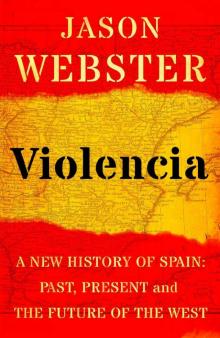 Violencia
Violencia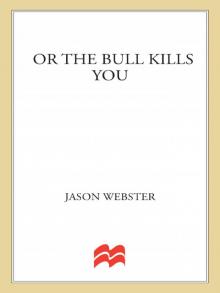 Or the Bull Kills You
Or the Bull Kills You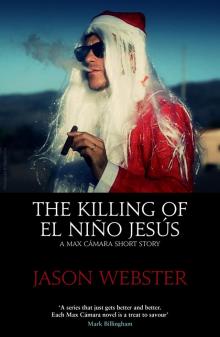 The Killing of El Niño Jesús
The Killing of El Niño Jesús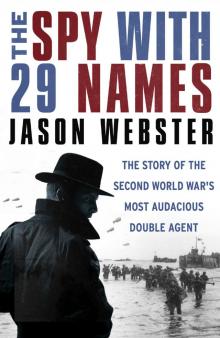 The Spy with 29 Names
The Spy with 29 Names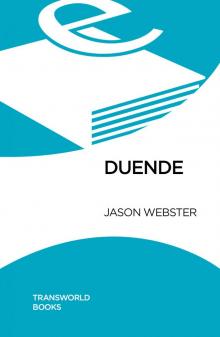 Duende
Duende Guerra
Guerra Sacred Sierra
Sacred Sierra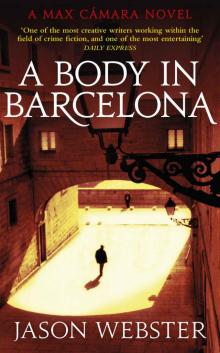 A Body in Barcelona: Max Cámara 5
A Body in Barcelona: Max Cámara 5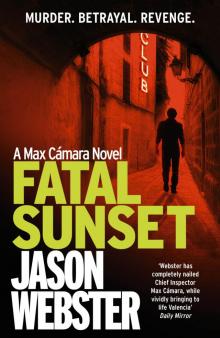 Fatal Sunset
Fatal Sunset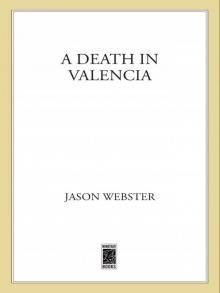 A Death in Valencia
A Death in Valencia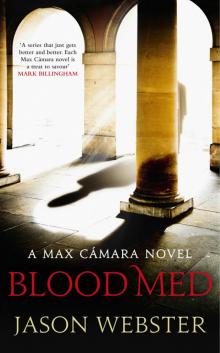 Blood Med
Blood Med Andalus
Andalus